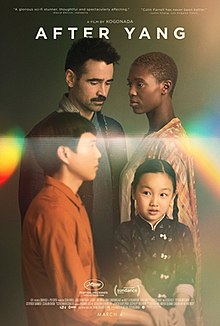楊之後:修订间差异
Sa Young Sun(留言 | 贡献) 无编辑摘要 |
|||
| 第96行: | 第96行: | ||
《[[紐約時報]]》的布蘭登·-{于}-(Brandon Yu)稱電影是人類的存在危機,要求觀眾需評估活著的意義<ref>{{cite news |last=Yu |first=Brandon |title=With His Sci-Fi Android, a Filmmaker Considers What It Means to Be Alive |url=https://www.nytimes.com/2022/03/04/movies/kogonada-after-yang-film.html |date=2022-03-04 |url-access=limited |work=[[紐約時報|The New York Times]] |access-date=2022-03-07 |archive-date=2022-03-24 |archive-url=https://web.archive.org/web/20220324194300/https://www.nytimes.com/2022/03/04/movies/kogonada-after-yang-film.html }}</ref>。《[[Polygon|多邊形]]》的利欧·金(Leo Kim)表示影片考慮多個問題,包括「失去的證明、審視我們對科技的依賴和有關在乎的深刻人性故事」<ref>{{cite news |last=Kim |first=Leo |title=''After Yang'' intentionally subverts sci-fi's fetishistic 'hollow Asian' trope |url=https://www.polygon.com/22971003/after-yang-kogonada-interview-asian-robot-trope |date=2022-03-10 |work=[[Polygon]] |access-date=2022-03-11 |archive-date=2022-05-14 |archive-url=https://web.archive.org/web/20220514150817/https://www.polygon.com/22971003/after-yang-kogonada-interview-asian-robot-trope }}</ref>。《[[紐約客]]》的理查德·布羅迪(Richard Brody)認為電影的角色活在「瑣碎樂趣的軟式技術法西斯主義,以及名田高梧大膽、狡猾地呈現出吸引力的誘人表面」<ref>{{cite news |last=Brody |first=Richard |title=The Politics of Beauty in ''After Yang'' |url=https://www.newyorker.com/culture/the-front-row/the-politics-of-beauty-in-after-yang |date=2022-03-07 |work=[[紐約客|The New Yorker]] |url-access=limited |access-date=2022-03-09 |archive-date=2022-03-10 |archive-url=https://web.archive.org/web/20220310104019/https://www.newyorker.com/culture/the-front-row/the-politics-of-beauty-in-after-yang }}</ref>。《[[大西洋 (雜誌)|大西洋]]》的大衛·西姆斯(David Sims)稱這部電影問在充滿科技的世界中什麼意味著人類,並「最後變成憂戚的劇情片,就像個平靜的謎團,不僅試圖了解當中的人類主角,更去理解所有社會關係的深度基礎」<ref>{{cite news |last=Sims |first=David |title=A Small-Scale Sci-Fi Film That Asks the Genre's Biggest Question |url=https://www.theatlantic.com/culture/archive/2022/03/after-yang-review-robot-human/626558/ |date=2022-03-04 |work=The Atlantic |url-access=limited |accessdate=2022-03-07 |archive-date=2022-04-17 |archive-url=https://web.archive.org/web/20220417221128/https://www.theatlantic.com/culture/archive/2022/03/after-yang-review-robot-human/626558/ }}</ref>。 |
《[[紐約時報]]》的布蘭登·-{于}-(Brandon Yu)稱電影是人類的存在危機,要求觀眾需評估活著的意義<ref>{{cite news |last=Yu |first=Brandon |title=With His Sci-Fi Android, a Filmmaker Considers What It Means to Be Alive |url=https://www.nytimes.com/2022/03/04/movies/kogonada-after-yang-film.html |date=2022-03-04 |url-access=limited |work=[[紐約時報|The New York Times]] |access-date=2022-03-07 |archive-date=2022-03-24 |archive-url=https://web.archive.org/web/20220324194300/https://www.nytimes.com/2022/03/04/movies/kogonada-after-yang-film.html }}</ref>。《[[Polygon|多邊形]]》的利欧·金(Leo Kim)表示影片考慮多個問題,包括「失去的證明、審視我們對科技的依賴和有關在乎的深刻人性故事」<ref>{{cite news |last=Kim |first=Leo |title=''After Yang'' intentionally subverts sci-fi's fetishistic 'hollow Asian' trope |url=https://www.polygon.com/22971003/after-yang-kogonada-interview-asian-robot-trope |date=2022-03-10 |work=[[Polygon]] |access-date=2022-03-11 |archive-date=2022-05-14 |archive-url=https://web.archive.org/web/20220514150817/https://www.polygon.com/22971003/after-yang-kogonada-interview-asian-robot-trope }}</ref>。《[[紐約客]]》的理查德·布羅迪(Richard Brody)認為電影的角色活在「瑣碎樂趣的軟式技術法西斯主義,以及名田高梧大膽、狡猾地呈現出吸引力的誘人表面」<ref>{{cite news |last=Brody |first=Richard |title=The Politics of Beauty in ''After Yang'' |url=https://www.newyorker.com/culture/the-front-row/the-politics-of-beauty-in-after-yang |date=2022-03-07 |work=[[紐約客|The New Yorker]] |url-access=limited |access-date=2022-03-09 |archive-date=2022-03-10 |archive-url=https://web.archive.org/web/20220310104019/https://www.newyorker.com/culture/the-front-row/the-politics-of-beauty-in-after-yang }}</ref>。《[[大西洋 (雜誌)|大西洋]]》的大衛·西姆斯(David Sims)稱這部電影問在充滿科技的世界中什麼意味著人類,並「最後變成憂戚的劇情片,就像個平靜的謎團,不僅試圖了解當中的人類主角,更去理解所有社會關係的深度基礎」<ref>{{cite news |last=Sims |first=David |title=A Small-Scale Sci-Fi Film That Asks the Genre's Biggest Question |url=https://www.theatlantic.com/culture/archive/2022/03/after-yang-review-robot-human/626558/ |date=2022-03-04 |work=The Atlantic |url-access=limited |accessdate=2022-03-07 |archive-date=2022-04-17 |archive-url=https://web.archive.org/web/20220417221128/https://www.theatlantic.com/culture/archive/2022/03/after-yang-review-robot-human/626558/ }}</ref>。 |
||
2022年,爛番茄網站整理「有史以來最好的81部亞裔美國電影」名單,本片排名第24名<ref>{{cite web |title=THE 81 BEST ASIAN-AMERICAN MOVIES OF ALL TIME |url=https://editorial.rottentomatoes.com/guide/best-asian-american-movies/ |website=Rotten Tomatoes |publisher=Fandango Media |accessdate=2022-05-02 |archive-date=2022-05-02 |archive-url=https://editorial.rottentomatoes.com/guide/best-asian-american-movies/}}</ref>。 |
|||
== 參考資料 == |
== 參考資料 == |
||
2022年9月20日 (二) 09:52的版本
| 楊之後 After Yang | |
|---|---|
 院線海報 | |
| 基本资料 | |
| 导演 | 名田高梧 |
| 监制 | |
| 剧本 | 名田高梧 |
| 原著 | 向楊說再見 亞歷山大·溫斯坦作品 |
| 主演 | |
| 配乐 |
|
| 摄影 | 本傑明·盧布 |
| 剪辑 | 名田高梧 |
| 制片商 | |
| 片长 | 96分鐘[1] |
| 产地 | 美國 |
| 语言 | 英語 |
| 上映及发行 | |
| 上映日期 |
|
| 发行商 |
|
| 票房 | 156,226美元[2] |
| 各地片名 | |
| 臺灣 | 人造眷戀[3] |
《楊之後》(英語:After Yang)是名田高梧執導、編劇和剪輯的2021年形上學科幻劇情片,由科林·法瑞尔、朱迪·特纳-史密斯、賈斯汀·閔、瑪麗亞·愛瑪·詹德拉維賈雅和海莉·盧·理查森主演,講述一組家庭嘗試修復他們無反應的機器人孩子。影片於2021年7月8日在坎城影展舉行全球首映,並於2022年3月4日由A24和Showtime發行。《楊之後》上映後取得好評。
劇情
傑克(Jake)和凱拉(Kyra)與養女米卡(Mika)和機器人孩子楊(Yang)住在一起,楊從認證經銷商「第二兄弟姊妹」買來,而非原始製造商「兄弟姊妹公司」。當楊沒有反應時,傑克開始執行修復他的任務。兄弟姐妹建議更換楊,這意味著他的身體會被分化。傑克不想讓米卡傷心,決心拯救他的機器人孩子。楊在閃回中向困惑的米卡保證,雖然她是被收養,但仍然是這個家庭的一員。
傑克把楊帶到廉價修理工拉斯(Russ)那裏,拉斯聲稱自己發現了楊體內隱藏的攝像頭。傑克把「攝像頭」帶給博物館專業人員克萊奧(Cleo),她告知這實際上是楊的記憶庫。傑克回家後查看楊的記憶,其中包括楊生活中的點滴,以及與名叫艾達(Ada)的女人相處的時光。隔天,傑克把楊帶給克萊奧。在閃回中,楊對自己並非真正活著而感到難過。
傑克搜索是複製人的艾達,她證實了楊與她有過關係,解開了傑克的質疑。傑克和凱拉決定放下過去,讓楊分解並把他的記憶捐贈給博物館。在閃回中,楊和凱拉討論了來世的幾無可能。
傑克與楊的前任主人南希(Nancy)交談,她提到楊不是新產品。傑克在記憶庫中發現了可以解開楊更多記憶的設置,原來在傑克和南希前已經度過了一生,並與叫艾達的女生建立關係。年長的艾達一直在照顧楊氏首個家庭的老母親,之後死於車禍。年輕的艾達告訴傑克,楊記憶中的那個人是她的姑婆。晚上,米卡告訴傑克她不想和楊說再見。傑克同意了,米卡開始唱起以前在楊的記憶中聽過的歌。
演員表
- 柯林·法洛 飾 傑克
- 朱迪·特纳-史密斯 飾 凱拉
- 賈斯汀·閔 飾 楊
- 瑪麗亞·愛瑪·詹德拉維賈雅(Malea Emma Tjandrawidjaja) 飾 米卡
- 海莉·盧·理查森 飾 艾達
- 里奇·柯斯特 飾 拉斯
- 莎莉塔·喬杜芮 飾 克萊奧
- 小克利夫頓·柯林斯 飾 喬治(George)
- 黛博拉·赫德瓦尔(Deborah Hedwall) 飾 南希
製作

2018年6月,有消息稱製片人泰瑞莎·帕克取得亞歷山大·溫斯坦短篇故事《向楊說再見》("Saying Goodbye to Yang")的銀幕權,並將由名田高梧執導和編劇[4]。2019年2月,柯林·法洛據稱將出演由A24發行的《楊之後》[5][6]。2019年4月,格什菲·法拉哈尼、賈斯汀·閔、莎莉塔·喬杜芮和海莉·盧·理查森加入演員陣容[7]。隔月,朱迪·特纳-史密斯和小克利夫頓·柯林斯進入劇組,而特纳-史密斯頂替法拉哈尼[8][9]。主體拍攝於2019年5月1日展開[10]。
上映
電影在於2021年7月8日在坎城影展舉行全球首映,之後於2022年1月21日在日舞影展舉行北美首映,並贏得艾爾弗雷德·P·斯隆獎[11][12]。影片於2022年3月4日在影院和Showtime串流平台同步發行[13]。
反響
票房
電影首週在美國和加拿大的24座戲院大約入帳46,872美元[14]。
專業評價

評論匯總網站爛番茄共收集163篇影評,認可度達八成八,平均分7.8分(滿分10分),共識評價為「雖然《楊之後》的所及範圍偶爾無法掌握,但能給予願意留在低頻的人豐厚的回報」[16]。Metacritic基於39篇評論文章,平均分數為79(滿分100),綜合結果為「普遍好評」[17]。
《紐約時報》的布蘭登·于(Brandon Yu)稱電影是人類的存在危機,要求觀眾需評估活著的意義[18]。《多邊形》的利欧·金(Leo Kim)表示影片考慮多個問題,包括「失去的證明、審視我們對科技的依賴和有關在乎的深刻人性故事」[19]。《紐約客》的理查德·布羅迪(Richard Brody)認為電影的角色活在「瑣碎樂趣的軟式技術法西斯主義,以及名田高梧大膽、狡猾地呈現出吸引力的誘人表面」[20]。《大西洋》的大衛·西姆斯(David Sims)稱這部電影問在充滿科技的世界中什麼意味著人類,並「最後變成憂戚的劇情片,就像個平靜的謎團,不僅試圖了解當中的人類主角,更去理解所有社會關係的深度基礎」[21]。
2022年,爛番茄網站整理「有史以來最好的81部亞裔美國電影」名單,本片排名第24名[22]。
參考資料
- ^ After Yang. Sundance Film Festival. [2022-02-09]. (原始内容存档于2022-05-04).
- ^ After Yang at The Numbers. Nash Information Services, LLC. Retrieved 2022-03-06.
- ^ 電影萬物論 - 人造眷戀 After Yang. 台北電影節. [2022-07-11]. (原始内容存档于2022-07-11).
- ^ D'Alessandro, Anthony. Theresa Park's Pow! Developing Alexander Weinstein Short Story 'Saying Goodbye To Yang' For Big Screen. Deadline. 2018-06-08 [2022-05-23]. (原始内容存档于2020-10-15).
- ^ McNary, Dave. Colin Farrell to Star in A24 Robot Drama 'After Yang'. Variety. 2019-02-28 [2022-05-23]. (原始内容存档于2019-02-28).
- ^ Mike Jr, Fleming. A24 Greenlights 'After Yang'; Colin Farrell To Star & Kogonada To Direct. Deadline. 2019-02-28 [2022-05-23]. (原始内容存档于2020-10-18).
- ^ Sneider, Jeff. Exclusive: Golshifteh Farahani, Justin Min, Sarita Choudhury Join Colin Farrell in A24's 'After Yang'. Collider. 2019-04-16 [2022-05-23]. (原始内容存档于2019-04-16).
- ^ Tura, Alessandra. Gucci's Roman Extravaganza. Women's Wear Daily. 2019-05-28 [2019-06-03]. (原始内容存档于2019-05-29).
- ^ Collins, Clifton Jr. Not every script is worthy of the deep delve, but every now & then a gem is found leaving one pontificating 🤔 poetic ending wrapping on Grandpa's Bday, with a viewing of #HowardHawks #RioBravo ,big love to brother Adam @countingcrows #Zoe & #bluberry for support, movie nights,enlightening critical convos, perfect table setting for #kogonada @A24 #AfterYang , not to mention humbling life tune up from brother @shaunking and the beautiful people I was privileged to hear speak on #prisonreform . Be sure to follow PODCASTS. Instagram.com. 2019-05-31 [2019-06-03].
- ^ After Yang (PDF). nyc.gov. NYC Media & Production. [2019-04-30]. (原始内容 (PDF)存档于2016-01-17).
- ^ The Films of the Official Selection 2021. Cannes Film Festival. 2021-06-03 [2021-06-03]. (原始内容存档于2021-06-03).
- ^ 2022 Sundance Film Festival: Feature Films, Indie Episodic, New Frontier Lineups Announced – sundance.org. [2022-01-16]. (原始内容存档于2022-01-25).
- ^ Pulliam-Moore, Charles. Death is not the end of life in After Yang's first trailer. The Verge. 2022-02-01 [2022-02-01]. (原始内容存档于2022-02-15).
- ^ Domestic 2022 Weekend 9. Box Office Mojo. [2022-03-08]. (原始内容存档于2022-04-28).
- ^ 多個來源:
- Schager, Nick. Colin Farrell Will Break Your Heart in After Yang, a Quietly Revelatory Sci-Fi Parable. The Daily Beast. 2022-03-04 [2022-03-11]. (原始内容存档于2022-05-12).
- Zemler, Emily. After Yang: Fixing an Android Leads to a Precise, Beautiful Examination of What It Means to Be Human. The Observer. 2022-03-02 [2022-03-11]. (原始内容存档于2022-05-18).
- Greenblatt, Leah. After Yang review: Colin Farrell goes back to the future in a dreamy sci-fi drama. Entertainment Weekly. 2022-03-03 [2022-03-11]. (原始内容存档于2022-05-15).
- Coyle, Jake. Review: In After Yang, an android's death opens new doors. Associated Press. 2022-03-02 [2022-03-11]. (原始内容存档于2022-04-25).
- ^ "After Yang". Rotten Tomatoes. Fandango Media. [2021-10-10]. (原始内容存档于2022-04-22).
- ^ "After Yang". Metacritic. Red Ventures. [2022-02-28]. (原始内容存档于2022-05-23).
- ^ Yu, Brandon. With His Sci-Fi Android, a Filmmaker Considers What It Means to Be Alive. The New York Times. 2022-03-04 [2022-03-07]. (原始内容
 存档于2022-03-24).
存档于2022-03-24).
- ^ Kim, Leo. After Yang intentionally subverts sci-fi's fetishistic 'hollow Asian' trope. Polygon. 2022-03-10 [2022-03-11]. (原始内容存档于2022-05-14).
- ^ Brody, Richard. The Politics of Beauty in After Yang. The New Yorker. 2022-03-07 [2022-03-09]. (原始内容
 存档于2022-03-10).
存档于2022-03-10).
- ^ Sims, David. A Small-Scale Sci-Fi Film That Asks the Genre's Biggest Question. The Atlantic. 2022-03-04 [2022-03-07]. (原始内容
 存档于2022-04-17).
存档于2022-04-17).
- ^ THE 81 BEST ASIAN-AMERICAN MOVIES OF ALL TIME. Rotten Tomatoes. Fandango Media. [2022-05-02]. (原始内容存档于2022-05-02).
